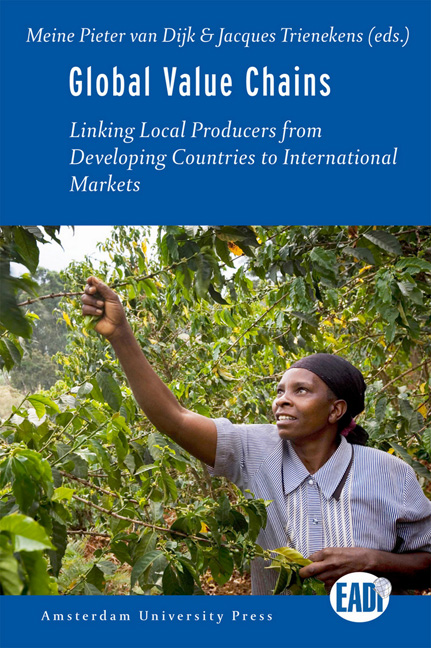Book contents
- Frontmatter
- Contents
- Part I Theoretical Contributions
- Part II Local Agricultural Value Chains
- Part III International Agricultural Value Chains
- Part IV Value Chains in the Industrial and Services Sector
- Part V Conclusions: Upgrading Value Chains in Developing Countries
- About the Authors
- Index
- Miscellaneous Endmatter
4 - Beer Multinationals Supporting Africa's Development?: How Partnerships Include Smallholders into Sorghum-beer Supply Chains
- Frontmatter
- Contents
- Part I Theoretical Contributions
- Part II Local Agricultural Value Chains
- Part III International Agricultural Value Chains
- Part IV Value Chains in the Industrial and Services Sector
- Part V Conclusions: Upgrading Value Chains in Developing Countries
- About the Authors
- Index
- Miscellaneous Endmatter
Summary
Introduction
Restrictions on the import of barley malt by the Nigerian government in the 1980s have facilitated an import substitution strategy that is now widely adopted by the African brewing industry. Barley malt is a key resource for beer brewing. Due to the Nigerian import ban, it was discovered that locally produced sorghum could serve as an adequate substitute for barley (Ogun, 1995). At present, all major brewers on the African continent partially substitute imported barley by sorghum and other locally produced crops, because they are cheaper and do not entail currency losses (Lapper, 2010; Wiggens, 2008). The African informal market of artisanal beers, wines and other drinks made from local ingredients, such as sorghum, is estimated to be four times bigger than the formal sector, and has a value of about USD 3 billion. Heineken, Guinness and SABMiller now compete with this African home-brew market (Capell, 2009).
The shift to local resources serves as an incentive for the development of local supply chains that could stimulate agricultural production in Africa. However, such chains are not easily created. In Sub-Saharan Africa, the sorghum grain (Sorghum bicolor) is grown in unpredictable “rain-fed” agriculture contexts, while farmers cannot afford the use of additional inputs. With 300 kg/ha the productivity of African sorghum farming is far below yields in other regions of the world that may reach 9,000 kg/ha (ICRISAT, 2008). In 2001, Guinness Ghana tried to set up a sorghum supply chain in Northern Ghana, but failed completely. The company had facilitated farmers in acquiring fertilizer, agrochemicals, as well as certified seeds of a new sorghum variety, Kapaala, but had to reject most of the grain one year later because of low quality (Kudadjie, 2006). The harsh climate and limitations in the institutional business environment hindered the African farmers to integrate into a modern value chain.
Considering the challenges of setting up robust sorghum supply chains for industrial brewing, multinational brewers have sought collaboration with NGOs and government agencies. In several African countries, partnerships have been established to advance the institutional changes required for the production of high-quality sorghum.
Partnerships can be defined as voluntary, collaborative arrangements between actors from the different societal domains – the state, market, and civil society –, which have an institutionalized, yet nonhierarchical structure and strive for a sustainability goal (Glasbergen et al., 2007).
Information
- Type
- Chapter
- Information
- Global Value ChainsLinking Local Producers from Developing Countries to International Markets, pp. 71 - 88Publisher: Amsterdam University PressPrint publication year: 2012
Accessibility standard: Unknown
Why this information is here
This section outlines the accessibility features of this content - including support for screen readers, full keyboard navigation and high-contrast display options. This may not be relevant for you.Accessibility Information
- 4
- Cited by
